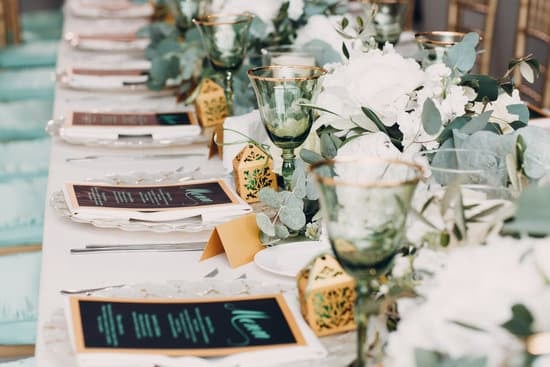Are wedding favors a necessary part of your big day? The question “do I have to do wedding favors?” has been a topic of discussion for many modern couples.
In this article, we will explore the tradition of wedding favors, their history, purpose, and significance, as well as modern alternatives and the financial impact they may have on your budget. We will also discuss the etiquette and expectations surrounding wedding favors, and weigh the pros and cons to help you make an informed decision for your special day.
The tradition of giving wedding favors dates back centuries, and understanding its origins can provide insight into why it continues to be a popular practice today. Additionally, we will examine the pressure some couples may feel to provide these tokens of appreciation to their guests, and how personalizing your wedding favors can make them meaningful for everyone involved.
Whether you are questioning the necessity of providing wedding favors or looking for creative alternatives that suit your budget and style, this article aims to explore all aspects of this time-honored tradition so that you can make the best decision for your own big day.
The History of Wedding Favors
The tradition of giving wedding favors dates back centuries and has been a symbol of gratitude and appreciation for guests who attend the celebration. Understanding the history of wedding favors can provide insight into why this tradition has endured for so long and why some couples feel obligated to continue it today.
Historically, wedding favors were first popularized by European aristocrats as early as the 16th century. These favors were often small trinkets or sugary treats, such as sugar cubes or almonds, known as “sugared almonds.” The practice was believed to bring good luck and prosperity to both the couple and their guests. Over time, wedding favors evolved to include personalized gifts, such as engraved silverware or porcelain figurines, a reflection of the couple’s status and wealth.
In addition to symbolizing good fortune, wedding favors also served as a way for the newlyweds to express their gratitude to their guests for sharing in their joyous occasion. This gesture of appreciation was especially important during times when marriage was not only a union of love but also a strategic alliance between families or communities.
Today, while the tradition of wedding favors has become more personalized and diverse, the underlying sentiment remains unchanged: it is an expression of thankfulness for the presence and support of loved ones on this special day.
- The tradition of wedding favors dates back centuries
- Wedding favors were popularized by European aristocrats in the 16th century
- Favors were believed to bring good luck and prosperity
The Purpose of Wedding Favors
Wedding favors have been a part of wedding traditions for centuries, but what is their purpose and significance? The tradition of giving wedding favors dates back to ancient times when it was believed that the bride and groom were providing their guests with good luck and fortune.
In some cultures, it was also a way to thank guests for attending the celebration. Today, the purpose of wedding favors has evolved, but understanding the significance behind them can help you make an informed decision about whether or not to include them in your big day.
One of the main purposes of wedding favors is to show appreciation to your guests for being a part of your special day. It’s a gesture that lets them know how much their presence means to you, and it can add a thoughtful touch to your wedding experience.
Wedding favors also serve as keepsakes that guests can take home with them as a memento of the celebration. This tangible reminder can evoke fond memories of your wedding day long after the event has passed.
In addition to expressing gratitude and providing keepsakes, wedding favors can also serve as a way to personalize your wedding and showcase your unique style as a couple. They are an opportunity for you to get creative and incorporate elements that reflect your personality or fit into the overall theme of your wedding.
Whether it’s through DIY crafts, edible treats, or thoughtful trinkets, personalized wedding favors can leave a lasting impression on your guests. However, keep in mind that while there are many benefits to including wedding favors in your celebration, there are also factors such as budget constraints and time constraints to consider when deciding whether or not to offer them.
| Purpose of Wedding Favors | Significance |
|---|---|
| Show appreciation to guests | Express gratitude and provide keepsakes |
| Personalize the wedding | Showcase unique style as a couple |
Modern Alternatives to Traditional Wedding Favors
When it comes to wedding favors, many couples are now choosing to think outside the box and opt for modern alternatives rather than traditional gifts. One popular alternative is making a donation to a charity in honor of each guest.
This not only adds a meaningful touch to your wedding, but it also helps those in need. Another modern option is to give guests an experience instead of a physical gift, such as a mini-seminar or workshop on a topic of interest.
Another unique idea for modern wedding favors is to give out personalized items that are practical and will actually be used by the guests. This could include items like custom reusable shopping bags, engraved wine stoppers, or even potted plants that can be taken home and planted in the guests’ gardens. These types of favors are not only thoughtful but also environmentally friendly.
Couples can also consider providing edible wedding favors, such as small jars of locally made honey, homemade jams, or artisanal chocolates. These delicious treats will surely be appreciated by the guests and won’t add clutter to their homes. Overall, when considering modern alternatives to traditional wedding favors, it’s important to choose something that reflects the couple’s personality and style while also being useful and meaningful for their guests.
| Alternative Wedding Favor Ideas | Description |
|---|---|
| Charitable Donation | A donation made in honor of each guest to a chosen charity |
| Practical Personalized Items | Custom reusable shopping bags, engraved wine stoppers, or potted plants as useful and thoughtful gifts |
| Edible Treats | Jars of locally made honey, homemade jams, or artisanal chocolates as delicious and appreciated favors |
The Financial Aspect
When planning a wedding, one of the most important aspects to consider is the budget. Every decision you make, from the venue to the decorations, can impact your finances. This includes the decision to provide wedding favors for your guests. The financial aspect of wedding favors is an important consideration for many couples as they plan their big day.
Cost Considerations
Wedding favors can range in cost depending on the type of favor and the number of guests attending your wedding. From small tokens like personalized keychains or candles to more elaborate gifts like custom-made cookies or wine bottles, the cost of providing favors can add up quickly. It’s essential to factor in this expense when creating your overall budget for the wedding.
Budget-Friendly Alternatives
For couples looking to minimize their expenses while still providing a thoughtful token of appreciation for their guests, there are budget-friendly alternatives to traditional wedding favors. DIY options, such as homemade jams or crafted bookmarks, can be both meaningful and cost-effective. Another option is to forgo physical favors altogether and instead donate to a charity in honor of your guests.
Impact on Overall Budget
Ultimately, it’s important to consider how providing wedding favors will impact your overall budget. While it’s a tradition that many couples choose to uphold, it’s essential to weigh the cost against other expenses and determine if it aligns with your financial priorities for your big day.
Etiquette and Expectations
Wedding favors have become a significant part of the modern wedding tradition, and many couples feel pressured to provide these tokens of appreciation to their guests. The etiquette surrounding wedding favors can be confusing, and it’s essential for couples to navigate this aspect of wedding planning with thoughtfulness and consideration.
While there is no hard-and-fast rule that dictates whether or not you have to provide wedding favors, it’s crucial to understand the expectations and etiquette associated with this tradition.
When considering whether or not to include wedding favors at your celebration, it’s important to weigh the pros and cons. Some couples may feel compelled to do so by societal expectations, while others may see it as an unnecessary expense. Ultimately, the decision should reflect your values as a couple and what feels authentic to you. Here are some points to consider when navigating the pressure to provide wedding favors:
1. Reflection of Gratitude: Wedding favors are a gesture of gratitude towards your guests for sharing in your special day. They serve as a tangible reminder of your appreciation for their presence.
2. Budget Considerations: It’s no secret that weddings can be expensive, and adding wedding favors to your budget may not be feasible for everyone. It’s essential to consider how much you’re willing and able to spend on these tokens.
3. Personalization: If you decide to do wedding favors, think about ways you can personalize them to make them meaningful for your guests. This can add a thoughtful touch and make the gesture more heartfelt.
By understanding the expectations and considerations surrounding wedding favors, couples can make an informed decision that aligns with their values and budget while still honoring the tradition in a way that feels meaningful for them and their guests.DO I HAVE TO DO WEDDING FAVORS.
Do I Have to Do Wedding Favors? Exploring the Pros and Cons
Wedding favors have been a tradition for centuries, with guests receiving small gifts as a token of appreciation for attending the wedding celebration. While this custom has evolved over time, many couples still wonder whether they are obligated to provide wedding favors. In this section, we will delve into the pros and cons of offering wedding favors, helping you make an informed decision for your special day.
The Pros of Providing Wedding Favors
One of the main advantages of giving wedding favors is that it serves as a thoughtful gesture to thank your guests for being part of your big day. It also adds a personal touch to the event and leaves a lasting impression on your guests. Wedding favors can also serve as keepsakes, reminding your loved ones of the joyous occasion they were part of.
The Cons of Providing Wedding Favors
On the other hand, some couples may feel that providing wedding favors adds unnecessary stress and expense to their wedding planning process. The cost of purchasing or creating personalized gifts for each guest can quickly add up, especially if you have a large number of attendees. Additionally, there is no guarantee that all guests will appreciate or use the favors, leading to potential wastage or unappreciated expenses.
Ultimately, whether or not you choose to provide wedding favors is entirely up to you and your partner. It’s important to weigh the pros and cons based on your budget and personal preferences before making a decision.
If you do decide to offer wedding favors, consider options that align with your theme and reflect your personalities as a couple. Remember that it’s the thought and effort behind the gesture that truly matters when it comes to showing gratitude to your guests on your special day.
Personalizing Your Wedding Favors
When it comes to wedding favors, personalization can make a significant impact on the overall experience for your guests. Instead of simply choosing generic trinkets or items that may end up collecting dust, taking the time to personalize your wedding favors can add a heartfelt touch and make them more meaningful for your loved ones. By incorporating a personal touch, you can show your gratitude and create a lasting memory for those who have shared in your special day.
One way to personalize your wedding favors is by incorporating elements that reflect your individual personalities as a couple. This could include creating custom labels or tags with your names and wedding date, selecting items that hold significance to both of you, or even crafting handmade favors that truly reflect your hobbies and interests.
By infusing these personal touches into your wedding favors, you are not only expressing your gratitude but also allowing your guests to feel connected to you as a couple.
Another way to personalize wedding favors is by considering the preferences and interests of your guests. Take into account their likes and dislikes when selecting or creating personalized gifts. Whether it’s through customized packaging, themed favors related to a location or activity significant to the guest, or even edible treats tailored to their tastes, making an effort to cater to their individual preferences adds a thoughtful touch.
Furthermore, personalizing wedding favors can also act as a lasting memento for guests to remember the joyous occasion. By choosing items that serve a practical purpose or have sentimental value, such as personalized keepsakes or useful everyday items with a personal touch, you are providing something that will continue to be cherished long after the celebration has ended. This thoughtful gesture will remind guests of the love and appreciation shared on your special day.
Conclusion
In conclusion, the decision of whether or not to provide wedding favors is ultimately a personal one that should be made thoughtfully and considerately. While the tradition of giving wedding favors has a long history and carries significance in terms of expressing gratitude to guests, it is important to recognize that modern alternatives exist and that the financial impact of wedding favors should be carefully considered.
It is also essential to navigate the expectations and pressure surrounding this aspect of wedding planning with grace and confidence.
When pondering the question “Do I have to do wedding favors?” it can be helpful to weigh the pros and cons. On one hand, providing meaningful tokens of appreciation can add a special touch to your big day and leave a lasting impression on your guests. On the other hand, some may see it as an unnecessary expense or worry about contributing to waste. Ultimately, the decision should align with your values, priorities, and budget.
Should you choose to include wedding favors in your celebration, consider personalizing them in a way that reflects your love story and makes them meaningful for your guests. Whether it’s through handmade crafts, locally sourced treats, or charitable donations in their honor, there are many ways to ensure that your wedding favors are a genuine reflection of your gratitude for those sharing in your special day.
Remember that there is no right or wrong answer when it comes to wedding favors – what matters most is that you make an informed decision that feels right for you and your partner.
Frequently Asked Questions
Is It Okay Not to Have Wedding Favors?
It is okay not to have wedding favors. While it has been a tradition to give out small gifts to wedding guests, many couples are opting to skip this expense. Guests are there to celebrate the couple, not for the favors.
Do You Have to Do Wedding Favours?
There is no hard and fast rule that says you have to do wedding favors. It ultimately comes down to personal preference and budget. Some couples choose to provide a small token of appreciation for their guests, while others do not feel it is necessary.
Are Wedding Favours Mandatory?
Wedding favors are not mandatory. The decision to give out wedding favors is entirely up to the couple getting married. Some may view it as a way of expressing gratitude to their guests, while others may prioritize other aspects of their wedding budget over favors.

I have been involved in marriages for over 20 years helping couples and singles understand more about them.





